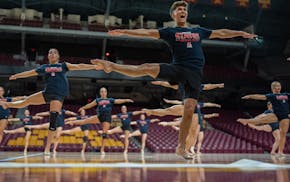A Twin Cities area softball player who helped lead her team to this week's state tournament is forcing a lot of Minnesotans who've sat quietly on the sidelines to think more deeply about the fairness of transgender athletes participating in girls' sports.
It's easy to shrug one's shoulders when the stakes are low, and with so few trans kids competing in youth sports. But when a high school girl who was reportedly born biologically male excels in her sport and wins, everything changes.
This is a complicated issue for a lot of people, no matter how strident and vitriolic the debate has become on social media.
Do you stand up for the girls competing against a transgender student-athlete who may have been been unfairly denied a trip to the state tournament, or a spot on the team, or a college scholarship? Or do you fully support the trans girl who deserves our compassion and a world where she knows she belongs?
Americans are increasingly tilting toward favoring limits on transgender people. About 66% of adults say trans athletes should compete on teams that match their sex assigned at birth, according to a Pew Research survey conducted in February. That's 8 percentage points higher than in 2022, with both Republicans and Democrats becoming more supportive of the restrictions over time. (The survey question, however, did not distinguish between adult and youth athletes.)
Political fervor is hardening stances and closing off any hope for a nuanced debate. A Minnesota kid who wants to play softball is embodying a space where respectful give-and-take is not allowed to exist. At the state tournament this week, softball parents were understandably reluctant to talk to my reporting colleagues even though they were aware of the controversy.
At the minimum, let's remember that the softball player in question doesn't deserve anyone's hate. Mentions of her athletic achievements online are invariably followed by vicious attacks against her and her family.
One of Minnesota's highest elected officials, U.S. Rep. Tom Emmer, called the player's participation in the state tournament "insanity" and blamed state leaders for allowing it to happen. His comments on X were a repost from Riley Gaines, a former swimmer who's trying to ban transgender athletes from women's sports. Gaines' post identified the Minnesota player, putting her first name in quotation marks, a slight seeming to discredit the girl's gender.
The Minnesota Star Tribune has not named the girl because she is a minor.
It's hard to join a debate when the loudest voices against her participation malign her and the existence of trans kids. The title of President Donald Trump's executive order, "Keeping Men Out of Women's Sports," tells you everything you need to know about whether he believes transgender females deserve the basic dignity of being labeled by their correct gender identity. Federal officials are now investigating the Minnesota State High School League's decade-old decision that opened girls' sports to transgender student-athletes.
Meanwhile, three high school softball players from Maple Grove and Farmington have sued state officials, hoping to bar trans athletes from competing in their sport.
Could individuals who've developed as biologically male have an athletic edge over those who haven't? Of course, and it should not be considered "transphobic" to say so.
On average, men are taller and larger than women. Testosterone builds strength and endurance. But is there a way trans females and their cisgender peers can find healthy competition within the same category? The available science can't answer that question. Research shows that once testosterone is reduced through hormone therapy, decreases in muscle mass and physical stamina typically follow. But a 2020 study suggested that even after a year of hormone therapy, trans women keep some athletic advantages over cisgender women.
There is no perfectly level playing field.
It's not fair that some athletes have access to high-quality coaching and resources while others don't. It's also not fair that Michael Phelps was blessed with a wide wingspan and unusually large hands and feet.
Science won't answer the human question of whether we ought to shut out kids from participating in the cultural touchstone that is youth sports.
In a run-of-the-mill interview I caught of the Minnesota softball player, filmed before the controversy exploded, she seemed like any other young athlete, with a shy smile, swelling with pride over the work she put into her game. I can't fault the high school league for opening its doors so kids like her have a shot in athletics. She's learning how to find grace under pressure, the values of teamwork and mastering a skill she was maybe once terrible at.
I couldn't imagine denying that vital opportunity to any kid, especially one who is more vulnerable to bullying and depression.
Now is the time to find an acceptable balance between the extremes. In California last week, organizers of the state high school track and field championship duplicated medals and changed the rules so more girls could compete in events that included a trans athlete. Trump had threatened to cut funding to the state if it allowed a trans girl to compete, and a plane flew over the stadium with a banner that read "No Boys in Girls' Sports!"
The new rule allowed AB Hernandez, a transgender athlete, to share her state title victories — and her place on the the podium — with the cisgender girls who finished behind her. In one scene captured by the New York Times, Hernandez and one of her competitors put their hands around each other and posed for photos with their medals.
That sweet, ordinary moment, far away from the noise, should give us hope that the outrage of adults may one day be calmed by the acceptance of youth, and that there is a possible middle ground that strives for both fairness and inclusion.

Yuen: When cancer struck a second time, she found 'euphoria'

Yuen: The University of Minnesota's first male dance team member is turning heads by staying real
Yuen: How George Floyd's aunt healed her heart and lent her voice for justice


